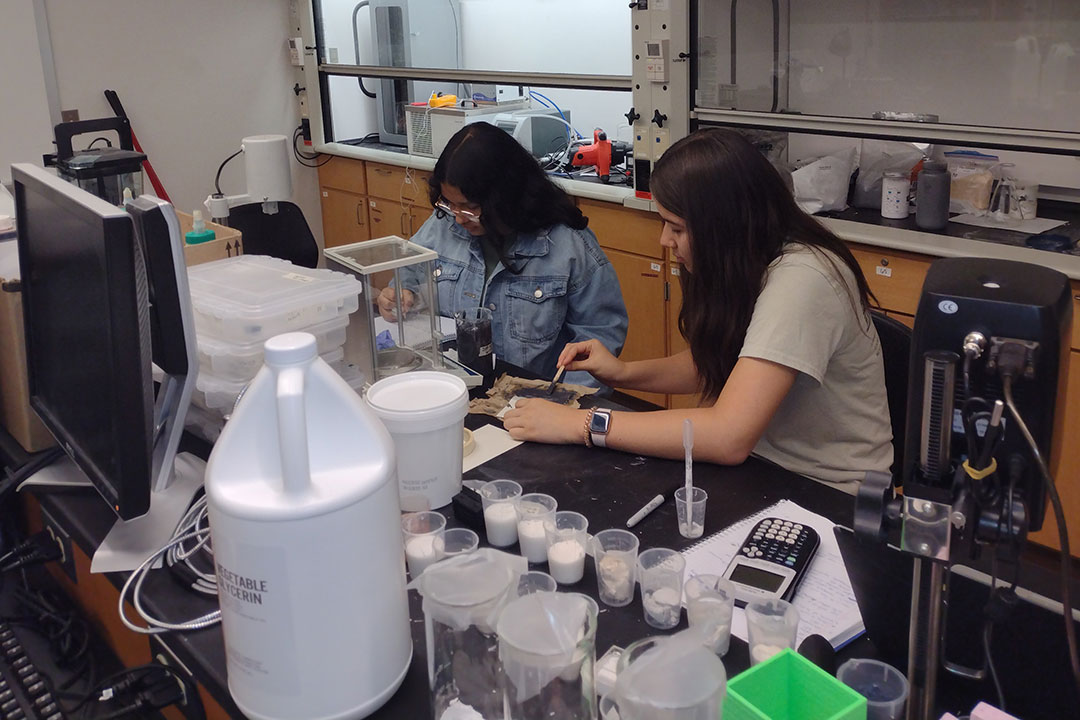Students work with UNI faculty on research projects through RIT-led program sponsored by U.S. Army
RIT’s K-12 University Center administers Army Educational Outreach Program Apprenticeships and Fellowships to provide students with summer STEM internships at Army sites, partner universities across the country
Marcy Seavey
High school students Elise Hong-Miller and Mariana Torres are working on a physics lab project with Dr. Tim Kidd, physics professor from the University of Northern Iowa, that allows them to learn more about cellulose-based material science. Through hands-on research, the students are using experiments to help familiarize themselves in the process of creating nanocellulose batches, with an end goal to propose a solution for a specific possible nanocellulose application.
As students from across the country apply to apprenticeship and fellowship experiences through the Army Educational Outreach Program, a goal of its centers, laboratories, partner sites and program staff is to make sure students are set up for success. It’s a collaboration that happens with program managers and those administering AEOP at Rochester Institute of Technology.
“We always have faculty who are planning on being our mentors for the summer, however sometimes during the review they discover that a specific student would do really well in another lab, and they reach out to that person,” said Marcy Seavey, STEM coordinator at the University of Northern Iowa. “That is how (one student) who applied for a computer science experience, ended up with physics professor Andrew Stollenwerk.”
Since 2018, the Cedar Falls, Iowa-based university has provided high school students with AEOP-sponsored summer apprenticeships opportunities, with past students having published scholarly work. This year, it focuses on biology, chemistry and physics at the university’s astrobiology underground lab, and physics and biology labs.
The astrobiology underground lab works in conjunction with conservationists and NASA to conduct research in cave systems as an analog to space environments and to provide guidance for cave conservation. Here, students carry out multiple chemical studies in caves as they relate to other planets with fieldwork including exploring several of Iowa and South Dakota's most pristine subterranean areas with the possibility of camping at the research sites.
The physics lab allows students to work with faculty who specialize in material science, such as modifying materials to enhance its potential for use in novel electronics, alternative energy and nanoscale devices. Biology lab research includes conservation, ecology and medical topics.
“Students are working on a project related to cellulose-based material science (and) their mentor is also a PI on Iowa's newly announced EPSCoR NSF grant,” Seavey said about one activity. “They had already learned how to make a small batch of nanocellulose and observed some of the properties, especially the undesirable physical properties.”
Seavey is also the host of the Summer Undergraduate Research Program Symposium, which AEOP apprentices from UNI present their research at.
RIT’s K-12 University Center administers the program on behalf of the U.S. Army with sites across the country at Army laboratories and partner universities. The University of Northern Iowa – sometimes called UNI – is one of those collaborators that brings real world STEM experiences to students seeking to enhance their knowledge in science, technology, engineering and math that complements the things they’re most passionate about. These opportunities often lead participants to scholarships through the Department of Defense, furthering education in fields benefited by the DOD and civilian defense jobs that have the ability to change the world.
With a staff of seven, AEOP Apprenticeships and Fellowships provides a system for students to apply and assists with promotion. They oversee the first review of the applications for minimum qualifications before handing it off to teams at partner universities and Army labs to review applications and decide what students can benefit best from an experience. The staff at RIT also provides students with information they need to participate in the program and arrange a portfolio of resources to better support students in their STEM journeys.





